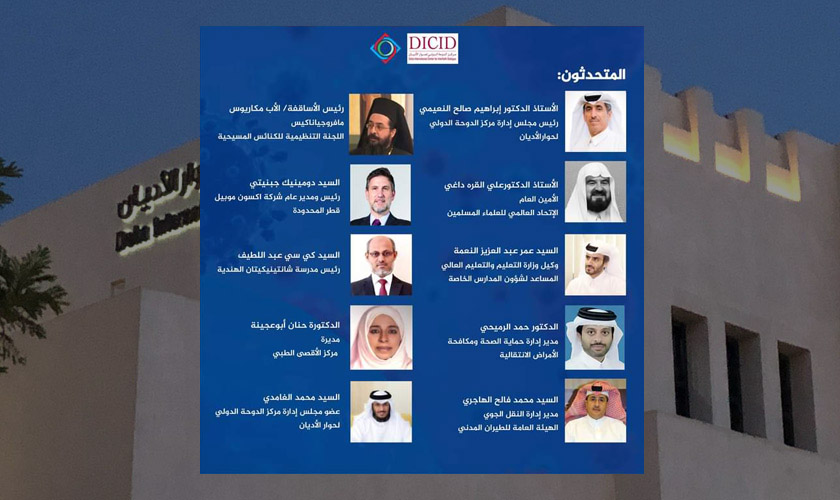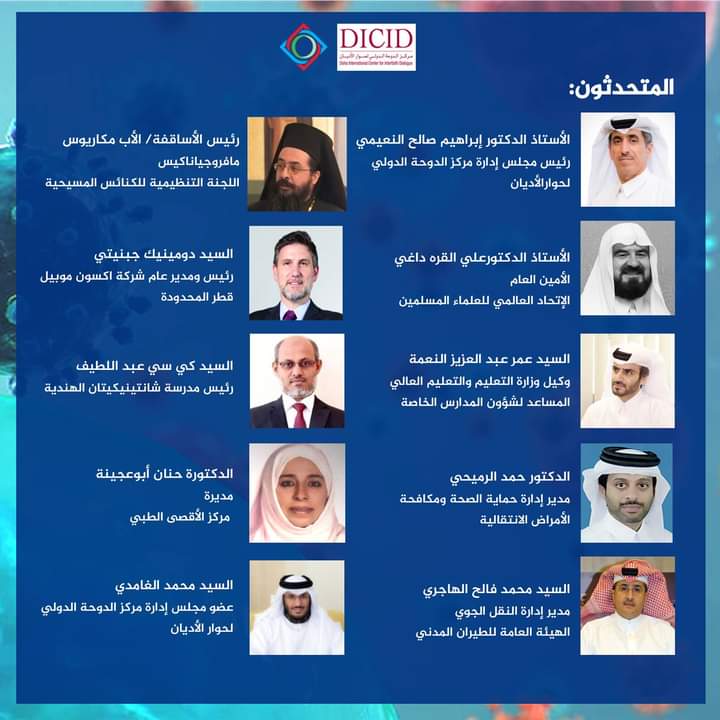
25 Feb DICID organizes the 10th Round Table on the Effect of COVID-19 Pandemic on Communities: Challenges and Confrontation
– Al-Naimi: “I feel proud of what the health sector has achieved in the State of Qatar in dealing with the challenges posed by the COVID-19 pandemic.”
– Al-Qaradaghi: “I urgently call for the establishment of a social cooperative fund at the level of each country and community in which the contributors of funds and all companies participate, to counter the economic effects of Corona.”
– Al-Ghamdi: “Since the outbreak of the Corona pandemic (Covid-19), Qatar Charity has taken the initiative to contribute locally to the efforts made by the State of Qatar and internationally in more than 30 countries around the world, in order to contain the pandemic and reduce its infection rate.”
– Archbishop Makarios: “We appreciate the efforts of the Qatari government in maintaining public health, and we support the safety and health measures.”
– Dominic Genetti: “With the help of the Qatar Ministry of Public Health, and through effective leadership and care for every employee; ExxonMobil Qatar has successfully overcome the challenges of remote work, one of the circumstances imposed by the Corona pandemic.”
– Omar Abdulaziz Al-Nama: “The transition to remote education in Qatar has not witnessed significant obstacles or difficulties since the use of distance education technology had already been an essential part of the educational process.”
– Hamad Al-Rumaihi: “The State of Qatar won the praise of the World Health Organization regarding its measures taken during the Corona crisis, as it recorded the lowest death rates during the pandemic.”
– Faleh Al-Hajri: “Despite the effects of the Corona pandemic on air transport; However, Qatar Airways, in coordination with the General Authority for Passenger Transport and the embassies of foreign countries, was able to be the largest operator in the world during this pandemic.”
– KC Abdullateef: “In a short period of time, we were able to develop pedagogical methods for digital education.”
– Hanan Abu Ajina: “The affected cases in Qatar received due attention, follow-ups, and were provided with suitable healthy environments, which made Qatar record the highest recovery rate among the affected countries and the lowest mortality rate.”
As part of its periodic activities in support of dialogue between local communities in Qatar, the Doha International Center for Interfaith Dialogue (DICID) organized the Tenth Round Table for Local Communities on Tuesday, February 16, 2021 under the title, “Effects of COVID-19 Pandemic on Communities: Challenges and Confrontation”. Due to the circumstances imposed by the spread of the virus, speakers and participants were prevented from meeting on-site meeting. In the interest of everyone’s safety the Center held this Round Table online.
His Excellency Prof. Dr. Ibrahim Saleh Al Naimi, Chairman of the Board of Directors of the Doha International Center for Interfaith Dialogue and the Undersecretary of the Ministry of Education and Higher Education opened the seminar with his speech. In addition, DICID was honored to host the seminar panel of top officials from vital sectors in Qatar such as the education, health, aviation sector as well as the petroleum sector all of which play major roles in confronting the pandemic. Mr. Dominic Genetti, President and General Manager of ExxonMobil Qatar Ltd. expounded on the repercussions of the pandemic on the economic climate and job opportunities. Mr. Omar Abdulaziz Al-Nama, Assistant Undersecretary of the Ministry of Education and Higher Education for Private Schools Affairs together with Mr. KC Abdul Latif, President of Shantiniketan Indian School presented with regard to the education sector. Dr. Hamad Al-Rumaihi, Director of the Health Protection Department and Communicable Diseases Control from the Ministry of Public Health and Dr. Hanan Abu Ajina, Director of the Al-Aqsa Medical Center, spoke on the success of the health sector in Qatar in dealing with the challenges posed by the Corona pandemic. The last topic of the round table came to address the impact of the Corona pandemic on travel by Mr. Muhammad Faleh Al-Hajri, Director of Air Transport under the Civil Aviation Authority.
The round table witnessed the participation of intellectuals from public officials and from the local communities. A large number of citizens and residents also participated in the follow-up.
The seminar was moderated by Mr. Mohammed Al-Ghamdi, a board member of the Doha International Center for Interfaith Dialogue.
The seminar successfully hosted a live simultaneous online translation to and from the Arabic and English language.
In his opening speech, Prof. Dr. Ibrahim Al-Naimi elucidated the need for such a discussion by stating, “The Center has been keen to hold its round table for communities despite the exceptional circumstances the world is going through in light of the spread of the Corona virus, going on its second year”. He added, “It is no secret to all that since the beginning of the pandemic, the world witnessed great turmoil on all levels and in all fields, unlike anything in recent history – the most important of them were its effects on the economic and health as well as education and travel sectors. Hence why we chose the title of this round table, “Effects of the COVID-19 Pandemic on Communities: Challenges and Confrontation”. This is in continuation of our community round tables, which we conduct periodically to discuss all issues and developments of interest to the communities in Qatar, and to deepen the bonds of friendship and brotherhood between all of us. We have made sure – as is our custom in the communities round tables that the speakers are not only from the officials entrusted with solutions, but also speakers representing the communities in Qatar to elaborate on the difficulties and challenges they faced, or are still facing as a result of this pandemic.
In his speech, Dr. Al-Naimi focused on the efforts made by the State of Qatar in all sectors to confront this pandemic, stating, “The State of Qatar was one of the first countries in the region to implement a set of precautionary and preventive measures to preserve the health and safety of citizens and residents, in parallel with adopting an integrated strategy in order to support its national economy as a result of the crisis and to build and maintain commercial and economic relations with important partners in various parts of the world. The State of Qatar has also demonstrated its high level of academic and administrative leadership in dealing with this pandemic, especially at the level of public or higher education by providing the types of education appropriate during various stages of the outbreak.
He also referred to the outstanding success of the health sector in the State of Qatar by stating, “The truth is that on a personal level, I feel proud of what the health sector in the State of Qatar has achieved in dealing with the challenges posed by the Corona virus pandemic, especially its strength, resilience and professionalism we have witnessed during this alarming pandemic that shook the corners of the world as a whole, and caused great confusion in the health sectors around the world, Europe and America included. Infact, we have all seen the importance the State of Qatar gives to the health sector with its excellent care and leadership under the guidance of His Highness Sheikh Tamim bin Hamad Al Thani, Emir of the State of Qatar, may God preserve him. Such dedication is based on his belief and recognition that man is the true wealth to move forward in revival and victory, without differentiation between the health of a citizen and a resident in Qatar.
It is worth noting that the community round tables that the Doha International Center for Interfaith Dialogue periodically hold are internal community dialogues, which are held in close periods of time among specialized researchers and university professors in Qatar to discuss issues in dialogue and social issues that concern to communities with the aim of enhancing trust and consolidating peaceful coexistence between individuals with different cultures and affiliations living in Qatar.
In these round tables, the Doha International Center for Interfaith Dialogue targets the Qatari society with all its components, focusing on the communities residing in Qatar in particular, and through it, it aims to consolidate a culture of constructive community dialogue between different cultures and religious affiliations, in order to extend bridges of understanding between the spectrum of society and acceptance of the other. This leads to a human partnership based on moral values through cultural and religious diversity. To crystallize a common culture based on tolerance, peaceful coexistence, mutual respect and coexistence, DICID therefore hosts roundtable seminars to address these societal issues of concern among citizens and residents in various fields of their lives, such as: education, media, legal culture, and other topics.




Sorry, the comment form is closed at this time.